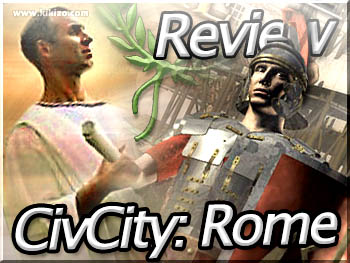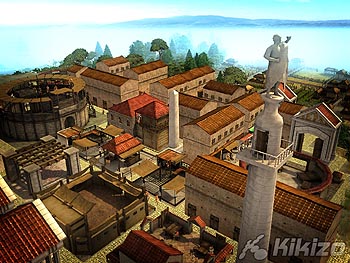CivCity: Rome
Sid Meier is back - sort of. Firefly Studios has been hard at work, and can be commended for its efforts.
| Version PC, PS2, Xbox, GCN | Developer Lionhead | Publisher Activision | Genre Sim |
||||
Based on the successful Civilization brand yet with no direct involvement from the original creator of the series, Firefly Studios has been hard at work developing CivCity: Rome and can be commended for its efforts. Billed as a innovative city-builder as opposed to a straight-forward strategy or military simulation, as with most titles within this genre it is still heavily reliant on resource management and planning.

Starting from humble beginnings the aim of the game is to build your city up from a small settlement into a thriving metropolis, enhancing its civilization rating in the process and winning favour with the senators of Rome. This takes place through a number of missions and tasks, starting with the standard tutorial levels and progressing into the main game. As you complete each mission, you will become noticed by politicians and militia who will task you with running other towns and cities as well as completing certain objectives, such as trading a certain amount of wine with Rome. It is from these simple concepts that a complex and engrossing game is formed.
The campaign mode is the first port of call for new CivCity players, the initial handful of missions gradually easing you into the game with the aforementioned tutorial mode however this is more than a by the numbers inclusion. Such is the game's depth that a gentle introduction is a necessity to prevent the player from becoming overwhelmed and stumbling along a steep learning curve. Beginning with a peaceful mission at the small town of Lavinium, the tutorial first gets you to grips with collecting resources such as stone and wood before moving onto more complex tasks such as farming, building wineries and olive presses, upgrading houses, planning aqueducts and cisterns to spread water throughout the city, building religious temples and so on for what seems like ad infinitum.
And after all this still new military missions appear and the complexity of managing your city increases again. Coupled with keeping the general populace happy and protected and researching topics that will improve your settlement, one has a game that even after many hours will continue to surprise and entertain as new features, buildings and research avenues emerge and new strategies are discovered and realized. These are hours that can slip by whilst finding ones feet in the game and learning its basic framework.
It is this framework that helps to keep the game challenging and entertaining and also sometimes exasperating. Due to the fact that certain buildings such as shacks must be built within the vicinity of several other buildings in order for them to progress into hovels and insulae and so forth, planning and understanding of the game's progression tree is a must. Building houses on one side of your settlement and water wells on the opposite side will not allow your houses to upgrade for the most part due to their inhabitants not traveling beyond a certain range. Thus careful planning is required to ensure there is enough land available both to begin with and in the future for all the required structures. This can be vexing especially for the novice player when trying to determine why their cities civilization level is not increasing and it's populace is unhappy. To its credit though the game never feels like it is getting away from the player and once its basic framework is understood it isn't long before that 'Eureka!' moment arrives.
Yet despite all this, despite all its intricacies the game never feels like getting away from the player. Building a sprawling city and watching its workers to-and-fro about their routines and daily lives is one of the more pleasing aspects of the game - just sitting back and watching your city do as it was built to do. Sure, there are times which induce panic, like outbreaks of fire or animal attacks but a carefully planned city can deal with these adversities. But to build such a city requires a level of foresight, planning and strategy that takes time to accumulate.
Any faults to be found with this game are relatively minor and primarily relate to the GUI. The interface is perhaps not the most intuitive and it is not possible to easily find certain building structures or to tell how many of a certain type you have in your city. And despite having all of the Roman Empire, the playing area when building your city is restricted to a rectangular grid. There are other minor gripes too, such as the games insistence on switching to a zoomed-in view when returning from certain menu screens and it's lack of any multiplayer options.
The game also boasts a couple of bonus features such as the Civilopedia and a Map Editor. The former of which is an encyclopedia of all things Rome and is accessible both from the main menu and in-game via clicking on the help icon for any object (who says you can't learn anything from games?). The Map Editor provides a way for those more inclined to create new maps and missions to share with others and in terms of playing with friends, this is as good as it gets.
All in all, this is an epic game fully deserving of the Civilization brand. To paraphrase an old adage, CivCity: Rome is reasonably easy to learn, yet difficult to master.
| ||||||||||||
|

















 Satoru Iwata Video Interview - the late Nintendo president spoke with Kikizo in 2004 as 'Nintendo Revolution' loomed.
Satoru Iwata Video Interview - the late Nintendo president spoke with Kikizo in 2004 as 'Nintendo Revolution' loomed. Kaz Hirai Video Interview - the first of Kikizo's interviews with the man who went on to become global head of Sony.
Kaz Hirai Video Interview - the first of Kikizo's interviews with the man who went on to become global head of Sony. Ed Fries Video Interview - one of Xbox's founders discusses an epic journey from Excel to Xbox.
Ed Fries Video Interview - one of Xbox's founders discusses an epic journey from Excel to Xbox. Yu Suzuki, the Kikizo Interview - we spend time with one of gaming's most revered creators.
Yu Suzuki, the Kikizo Interview - we spend time with one of gaming's most revered creators. Tetris - The Making of an Icon: Alexey Pajitnov and Henk Rogers reveal the fascinating story behind Tetris
Tetris - The Making of an Icon: Alexey Pajitnov and Henk Rogers reveal the fascinating story behind Tetris Rare founders, Chris and Tim Stamper - their only interview? Genuinely 'rare' sit down with founders of the legendary studio.
Rare founders, Chris and Tim Stamper - their only interview? Genuinely 'rare' sit down with founders of the legendary studio. The History of First-Person Shooters - a retrospective, from Maze War to Modern Warfare
The History of First-Person Shooters - a retrospective, from Maze War to Modern Warfare